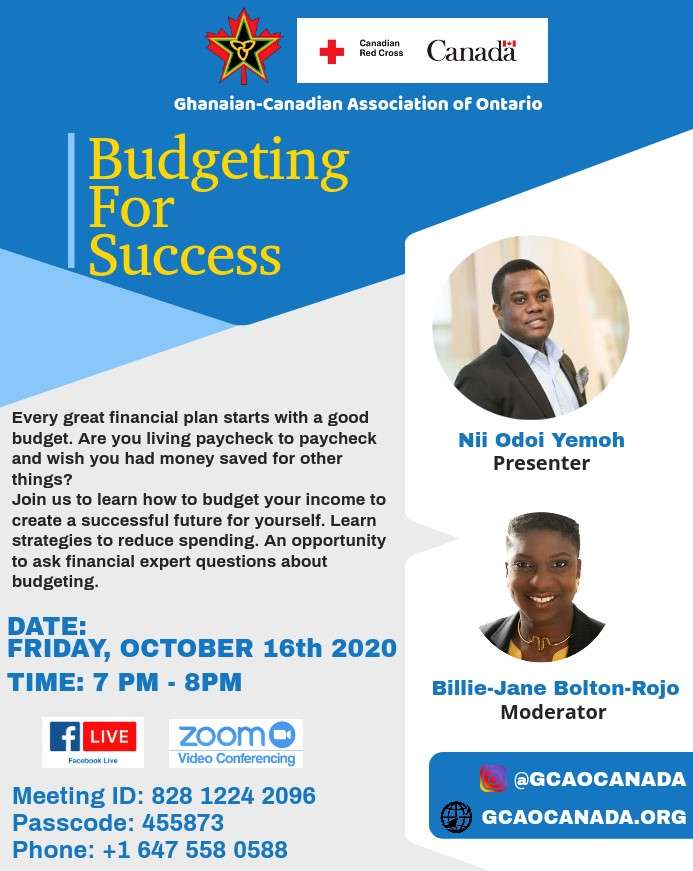
GCAO Financial Talk Series 1 – Budgeting for Success
On October 16, 2020, 55 participants joined the GCAO Financial Talk Series on zoom while Facebook had over 530 views to learn about Budgeting for success. The speaker for the event was Nii Odoi Yemoh, and Billie-Jane Bolton-Rojo was the moderator. They are both financial experts and shared ideas on budgeting.
Finances can be challenging conversations to have, according to Mr. Yemoh. Nevertheless, you are not alone because we are all working hard to understand our finances as we learn each day. This pandemic has made it challenging for many families to understand how to work with their finance.
Did you know that Finance is very important to your life as it is link to your health? If you have good finance, you have good health. Mr. Odoi addressed why we need a budget and how we do a budget. Budgeting helps us stop overspending. It helps us reach our goals, it also help us save money. Budget helps us stay on track with what we have instead of spending all we have. He provided few recommendations during the talk:
- Pay yourself first each time you receive a paycheck. It could be 10% or less, but you come first and so pay yourself before you pay anyone. Let say each month, you pay yourself $100, at the end of the year; you will save $1200 which you can use for whatever you may want. You can set up an automatic redraw from your bank to help you not forget to pay yourself first.
- Always have 6 months of annual salary saved for emergency.
Budgeting help you stop worrying and enjoy your money more. It is not about limiting thing in your life. It helps give you opportunity to have fun and not struggle. You get to worry less in the future and you are more confident in talking about what you want to do instead of stressing about it. People, who do not budget, find themselves wanting things and stressing about how to achieve it.
Budgeting is not a complicated activity. There are various apps available to use (e.g. mint, YNAB, pocket Guard, clarity money, Good budget, personal capital). The process is very simple:
- Do not set unrealistic goals. Set goals that you can achieve.
- Identify your income and expenses (how much money are you bringing in and what are you paying out?)
- Separate your needs from your want. Ask yourself, do I need it or I want it? (50% needs, 20% want, and 30% in savings). Needs are rent, transportation, or things you cannot live without. Wants are things you can live without. Everyone may have different needs.
- Put your plan into action; match your spending to when you receive income.
The more you pay your debt, the happier you are. Your main key will be to get out of debt. If overspending is your challenge, set up alerts to help you stay on budget.
This workshop was impactful as many who attended had questions and made recommendation to schedule future talks a little longer, and dedicated time for answering questions. Overall, everyone enjoy the talk and look forward to series 2 talk on “Understanding how money works” on Friday, October 30, 2020.
Published by Mary Akuamoah-Boateng


